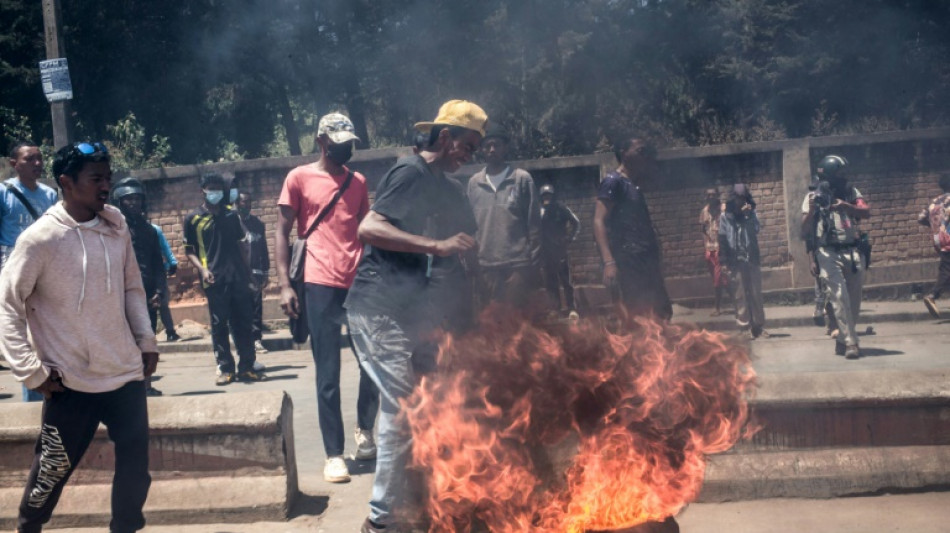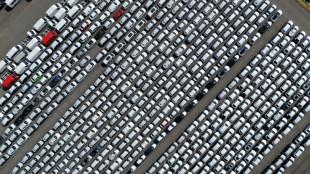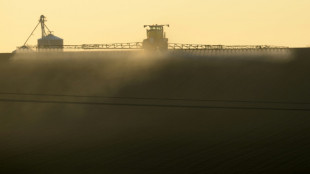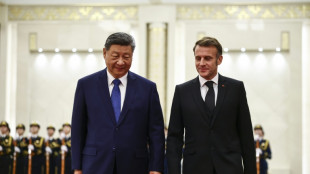
| RBGPF | 0% | 78.35 | $ | |
| BCC | -1.66% | 73.05 | $ | |
| GSK | -0.33% | 48.41 | $ | |
| NGG | -0.66% | 75.41 | $ | |
| BTI | -1.81% | 57.01 | $ | |
| CMSC | -0.21% | 23.43 | $ | |
| SCS | -0.56% | 16.14 | $ | |
| BP | -3.91% | 35.83 | $ | |
| AZN | 0.17% | 90.18 | $ | |
| JRI | 0.29% | 13.79 | $ | |
| RELX | -0.55% | 40.32 | $ | |
| CMSD | -0.3% | 23.25 | $ | |
| VOD | -1.31% | 12.47 | $ | |
| RYCEF | -0.34% | 14.62 | $ | |
| RIO | -0.92% | 73.06 | $ | |
| BCE | 1.4% | 23.55 | $ |

Madagascar protests reignite, UN says at least 22 dead
Thousands of demonstrators poured into the streets across Madagascar on Monday, as police fired tear gas to disperse the latest bout of unrest in the poor country that the UN said had left at least 22 people dead in less than a week.
Two days of protests last week erupted in clashes with police as mostly young demonstrators, called to action on social media through a movement called "Gen Z", demonstrated against persistent water and power cuts across the nation.
The Indian Ocean island nation, among the world's poorest, has experienced frequent popular uprisings since gaining independence in 1960, including mass protests in 2009 that forced former president Marc Ravalomanana from power.
UN High Commissioner for Human Rights Volker Turk condemned Madagascar's "violent response" to the protests which his office said had left more than a hundred injured" in the latest bout of unrest.
President Andry Rajoelina was due to speak around 1700 GMT, after protests hit several cities across Madagascar including the capital, where security forces dispersed crowds with tear gas, AFP journalists saw.
Growing crowds marched through the capital Antananarivo, many dressed in black and chanting calls for Rajoelina to resign.
He first came to power following a coup sparked by the 2009 uprising.
Some demonstrators held signs reading "We want to live, not survive," a central slogan of the movement.
Police detained an opposition lawmaker during the march in Antananarivo, footage shared on social media showed, prompting calls from his colleagues for his release.
At least one other protester was also arrested, prompting the UN's Turk to urge the authorities to "ensure respect for freedom of expression and peaceful assembly".
A statement released by the protest movement late Sunday called for the government and Antananarivo's prefect to resign. They have also targeted figures close to the president including Prime Minister Christian Ntsay and businessman Mamy Ravatomanga.
The movement has adopted as its rallying symbol a pirate flag from the Japanese anime series "One Piece", a logo also used recently by youth-led, anti-regime protests in Indonesia and Nepal.
- 'Anonymous individuals' -
Thursday's protests in the capital were followed by widespread looting throughout the night, which encountered no police response.
The Gen Z movement said in its Sunday statement that "groups of anonymous individuals were paid to loot numerous establishments in order to tarnish the movement and the ongoing struggle".
The movement was named after Generation Z, a nickname attributed to people born between the late 1990s and early 2010s.
Protests were also widespread in Antsiranana at the northern tip of Madagascar.
The demonstrations were the largest since 2023 when protests erupted ahead of the presidential elections, which were boycotted by opposition parties.
Rajoelina, a former mayor of Antananarivo, stepped down after 2013 general elections but triumphed in the 2018 presidential election, winning re-election in contested polls in 2023 in which less than half of registered voters cast their ballots.
In a video address late Friday, the president said he had sacked his energy minister "for not doing his job". He also condemned the violence as "acts of destabilisation".
On Sunday, he told residents of a working-class neighbourhood of Antananarivo that he would "fix everything, to be even closer" to the people.
Despite having natural resources, Madagascar remains one of the poorest countries in the world and is among the most corrupt, ranked 140 out of 180 countries in Transparency International's Corruption Perceptions Index.
Nearly 75 percent of the population lived below the poverty line in 2022, according to the World Bank.
The latest unrest is just the latest to hit Madagascar since the end of French rule.
Philibert Tsiranana, who led the country through the post-independence era, was forced to hand over power to the army in 1972, after a popular uprising was bloodily suppressed.
J.F.Rauw--JdB


